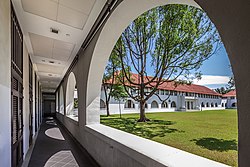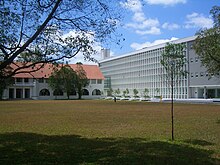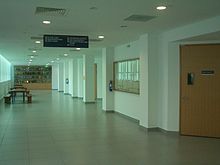National University of Singapore Faculty of Law
 | |
| Established | 1956 |
|---|---|
Parent institution | National University of Singapore |
| Dean | Andrew Simester |
| Address | 469G Bukit Timah Rd, Singapore 259776 , Singapore , Singapore 1°19′07″N 103°48′54″E / 1.3187°N 103.8150°E |
| Website | www |
The National University of Singapore Faculty of Law (NUS Law) is Singapore's oldest law school. NUS Law was initially established in 1956 as the Department of Law in the University of Malaya, and subsequently, University of Singapore. After its establishment, NUS Law was Singapore's only law school for half a century, until the subsequent establishment of the SMU School of Law in 2007 and the SUSS School of Law in 2017. NUS Law is currently located at the NUS Bukit Timah Campus.[1] The current dean of NUS Law is Andrew Simester.[2] Internationally, NUS Law has been ranked twelfth by the QS World University Rankings by Subject in 2024 and eleventh by the Times Higher Education World University Rankings by Subject in 2024.[3][4]
History
[edit]


After its establishment in 1956 as the Department of Law of the University of Malaya, NUS Law attained faculty status in 1959, and Lionel Astor Sheridan was appointed as its founding dean. Its pioneer batch of students graduated in 1961, featuring future notable figures such as Chan Sek Keong and Tommy Koh. After the division of the University of Malaya in 1962, the faculty continued as part of the new University of Singapore. Subsequently, the faculty became part of the National University of Singapore which was formed in 1980 by a merger between the University of Singapore and Nanyang University.[5]
Undergraduate programmes
[edit]The LL.B. programme at NUS Law is a four-year programme. Students take compulsory modules in their first two years and elective modules in their third and fourth years. In terms of exposure to non-law subjects, students may choose to take non-law elective modules offered by other NUS faculties, read for minors outside of law, and take on concurrent or double degree programmes.[6]
Undergraduate students may go on exchange to study in a law school in a foreign jurisdiction. Students on the exchange programme pay only tuition fees at the NUS Law rate. Selected students can also combine completion of their LL.B. at NUS Law with an LL.M. from a partner institution in four years.[7]
The indicative grade profile of the tenth percentile of GCE A-Level applicants offered places in its LL.B. programme in 2020 was AAA/A.[8] Applicants are required to sit for a selection test and attend a formal interview to assess their suitability for the study of law.[9]
Graduate programmes
[edit]For graduate students, NUS Law offers a J.D. programme, several coursework LL.M. programmes, and a research Ph.D. programme. Admissions for graduate programmes generally require a good bachelor's degree in law.[10]
Publications
[edit]NUS Law publishes the Singapore Journal of Legal Studies, one of the oldest law journals in the Commonwealth.[11] It also produces the Asian Journal of International Law (which is published by Cambridge University Press and succeeds the Singapore Year Book of International Law),[12] and the Asian Journal of Comparative Law (also published by Cambridge University Press).[13]
Additionally, the Singapore Law Review,[14] which is Asia's oldest student-run legal publication, is managed exclusively by the students of NUS Law.
Centres
[edit]NUS Law hosts the following centres:[15]
| Centre | Established |
|---|---|
| Asia-Pacific Centre for Environmental Law (APCEL) | 1996 |
| Asian Law Institute (ASLI) | 2003 |
| Centre for International Law (CIL) | 2009 |
| Centre for Asian Legal Studies (CALS) | 2012 |
| EW Barker Centre for Law & Business (EWBCLB)[16] | 2013 |
| Centre for Banking & Finance Law (CBFL) | 2014 |
| Centre for Legal Theory (CLT) | 2015 |
| Centre for Maritime Law (CML) | 2015 |
| Centre for Pro Bono & Clinical Education (CPBCLE) | 2017 |
| Centre for Technology, Robotics, Artificial Intelligence & the Law (TRAIL)[17] | 2019 |
In addition, NUS Law also hosts the Secretariat of the Asian Society of International Law (AsianSIL).[18]
Deans
[edit]The deans of NUS Law from 1956 to present are listed below:[5]
| S/N | Name | Term of office |
|---|---|---|
| 1. | Lionel Astor Sheridan | 1956–1962 |
| 2. | Chua Boon Lan | 1962–1963 |
| 3. | Harry E. Groves | 1963–1964 |
| 4. | Leslie C. Green | 1964–1965 |
| 5. | James Louis Montrose | 1965–1966 |
| 6. | Geoffrey W. Bartholomew | 1966–1968 |
| 7. | Thio Su Mien | 1968–1971 |
| 8. | Tommy Koh | 1971–1974 |
| 9. | S. Jayakumar | 1974–1980 |
| 10. | Tan Sook Yee | 1980–1987 |
| 11. | Tan Lee Meng | 1987–1992 |
| 12. | Chin Tet Yung | 1992–2001 |
| 13. | Tan Cheng Han | 2001–2011 |
| 14. | Simon Chesterman | 2012–2022 |
| 15. | Andrew Simester | 2023– |
Notable alumni
[edit]NUS Law has produced a number of notable alumni, including Senior Counsel, Attorneys-General, Members of the Singapore Parliament, Ministers of the Cabinet of Singapore and Judges of the Supreme Court of Singapore:
Academia
[edit]- Tan Cheng Han, SC – former Dean of NUS Faculty of Law
- Thio Su-Mien – former Dean of NUS Faculty of Law
- Leslie Chew, SC – founding Dean of SUSS School of Law[19]
Arts
[edit]- Eleanor Wong – playwright
- Ong Keng Sen – Director of theatre group, TheatreWorks
- Adrian Tan – Author of Teenage Textbook series and 27th President of the Law Society of Singapore[20]
Business
[edit]- Tan Min-Liang – Co-founder, CEO and Creative Director of Razer Inc[21]
- Priscilla Shunmugam – Founder of Ong Shunmugam
- Wong Peck Lin – Co-founder of Udders[22]
- Lyn Lee – Founder of Awfully Chocolate and Sinpopo[23]
Judicial
[edit]- Sundaresh Menon, SC – Chief Justice and former Attorney-General[24]
- Chan Sek Keong, SC – former Attorney-General, and Chief Justice[25]
- Steven Chong, SC – Judge of Appeal, former Attorney-General, and former Managing Partner of Rajah & Tann[24]
- Tay Yong Kwang – Judge of Appeal of the Supreme Court of Singapore
- Andrew Ang – former Supreme Court Judge
- Kan Ting Chiu – former Supreme Court Judge
- Lai Siu Chiu – former Supreme Court Judge
- Foo Chee Hock, SC – former Supreme Court Judicial Commissioner, and Founding Dean of the Singapore Judicial College
- Hri Kumar, SC – Supreme Court Judge, former Deputy Attorney-General and former Member of Parliament for Bishan-Toa Payoh GRC
- Andrew Phang, SC – former Judge of Appeal[26]
- Woo Bih Li, SC – Supreme Court Judge
- Judith Prakash – Senior Judge and former Judge of Appeal[27]
- V. K. Rajah, SC – former Judge of Appeal, and Attorney-General, and former Managing Partner of Rajah & Tann[24]
- Tan Lee Meng – Supreme Court Judge and former Dean of NUS Faculty of Law[26]
- Ahmad Fairuz Abdul Halim – former Chief Justice of Malaysia
- Debbie Ong – Supreme Court Judge and Presiding Judge of the Family Justice Courts[28]
Public service
[edit]- Tommy Koh – Ambassador-at-Large for Singapore and former Dean of NUS Faculty of Law[26]
- Ong Keng Yong – Director of the Institute of Policy Studies and former Secretary-General of ASEAN
- Daren Tang – Director General of the World Intellectual Property Organization[29]
- Walter Woon, SC – former Attorney-General and diplomat
Politics
[edit]- K. Shanmugam, SC – Minister for Law, and Home Affairs[26]
- Davinder Singh, SC – former CEO of Drew & Napier and former Member of Parliament[24]
- Desmond Lee – Minister for National Development[30]
- Edwin Tong, SC – Minister for Culture, Community and Youth and Second Minister for Law[31]
- Indranee Rajah, SC – Minister in the Prime Minister's Office[24]
- S. Jayakumar – former Deputy Prime Minister, and Dean of NUS Faculty of Law[32]
- Halimah Yacob – 8th President of Singapore[33]
- Ho Peng Kee – former Senior Minister of State for Law, and Home Affairs
- Sin Boon Ann – former Member of Parliament for Tampines GRC[24]
- Sylvia Lim – Chair of the Workers' Party[30]
- Karpal Singh – Former Member of the Malaysian Parliament[34]
- Murali Pillai, SC – Minister of State for Law and for Transport
References
[edit]- ^ "If buildings could talk – think what anecdotes!". The Straits Times.
- ^ "NUS appoints Professor Andrew Simester as its new law dean". The Straits Times.
- ^ "QS World University Rankings for Law & Legal Studies 2024". Top Universities.
- ^ "World University Rankings 2024 by subject: law". Times Higher Education.
- ^ a b "History & Milestones". NUS Law.
- ^ "Undergraduate Brochure 2020" (PDF).
- ^ Tan, Amelia (7 February 2011). "NUS, Boston varsity in law degree tie-up". The Straits Times. Singapore.
- ^ "Indicative Grade Profile (IGP)". NUS.
- ^ "NUS Law scheme to broaden student diversity". The Straits Times.
- ^ "Admission Requirements". NUS Law.
- ^ "Singapore Journal of Legal Studies". NUS Law.
- ^ "Asian Journal of International Law". Cambridge Core.
- ^ "Asian Journal of Comparative Law". Cambridge Core.
- ^ "The Singapore Law Review". The Singapore Law Review.
- ^ "Centres & Networks". NUS Law.
- ^ "Prime Minister Lee Hsien Loong launches new E W Barker Centre for Law and Business at NUS". The Straits Times.
- ^ "NUS launches new think tank to explore legal issues surrounding the use of technology". The Straits Times.
- ^ "Constitution". AsianSIL.
- ^ "Huge demand for UniSIM law school despite lawyer glut". Today Online.
- ^ "Law Society president Adrian Tan dies at 57 after battle with cancer". The Straits Times.
- ^ "Lunch With Sumiko: Razer founder Tan Min-Liang's 'insane drive to be the best'". The Straits Times.
- ^ "Udderly successful ice cream". The Straits Times.
- ^ "Sinfully Sinpopo". The Singapore Law Gazette.
- ^ a b c d e f "NUS law alumni reunite for 30th anniversary". The Straits Times.
- ^ "Ex-chief justice Chan Sek Keong honoured by NUS". The Straits Times.
- ^ a b c d "More students can earn first class honours from NUS Law". The Straits Times.
- ^ "ICAM 2018 Grand Finals". Justified.
- ^ "Hope for less contentious divorce under Family Justice Courts approach of therapeutic justice". The Straits Times.
- ^ "IPOS chief Daren Tang becomes first Singaporean to helm global intellectual property agency". The Straits Times.
- ^ a b "NUS alumni to comprise almost half of 14th Singapore Parliament". India Education Diary.
- ^ "NUS law students to provide pro bono service to arts institutions". The Straits Times.
- ^ "Former DPM S. Jayakumar appointed NUS pro-chancellor". The Straits Times.
- ^ "President Halimah attends NUS commencement". The Straits Times.
- ^ "This Tiger's still roaring". The Star. Archived from the original on 26 July 2010.
